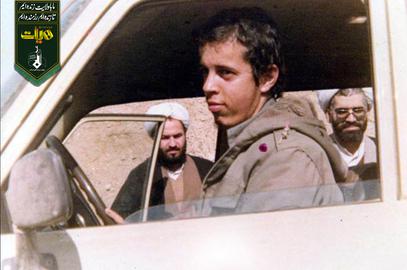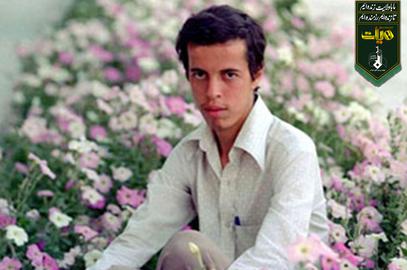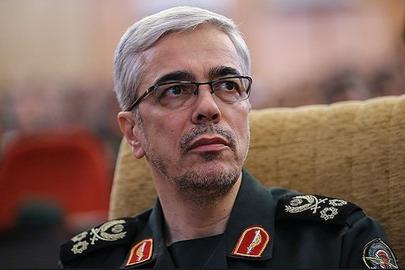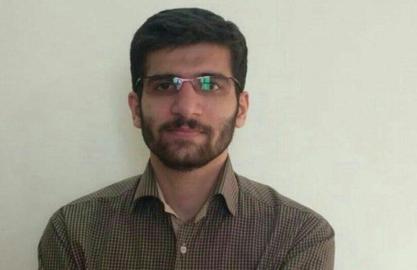The principal stage managers of the sprawling Revolutionary Guards organization are its generals and commanders. Each plays a leading role in one of the affiliate entities in this endless labyrinth. What do we know about them? Where they come from? What is their record? Where do they stand? What are their positions? What do we know about their personal lives?
In this series, we have tried to look into the lives of the most important Revolutionary Guards’ commanders — before they joined the Guards, when they did and where they stand now.
The elder Bagheri brother, Gholam-Hossein Afshordi, was one of the key figures in the early shaping of military tactics of the Islamic Revolutionary Guards Corps (IRGC), and the younger brother, Mohammad-Hossein Afshordi, became the youngest serving IRGC major general. At 56 years-old, he became the head of General Staff of the Armed Forces of the Islamic Republic of Iran.
During the Iran-Iraq War, they changed their names. Gholam took on the name Hassan Bagheri because of his involvement in clandestine operations and his promotion to the head of IRGC Intelligence and Operations. Gholam and his younger brother were so alike in appearance that Mohammad also decided to change his name to Mohammad Bagheri in a nod to his older sibling.
Hassan Bagheri
Hassan was born on March 16, 1956. According to his close friends, he began his political activism as a sophomore in high school. He was admitted to the Animal Science program at Urmia University in 1975. Shortly thereafter, he was expelled from the school for allegedly promoting Islamic ideas and principles. He applied once more in 1980 and was admitted to a Criminal Justice program at Tehran University.
Before joining the IRGC, Hassan Bagheri worked as a journalist at Jomhuri Islami (the Islamic Republic) newspaper. During that time, the Amal Movement invited him to Lebanon and Jordan to write a report about Islamic life there.
In the early days of the war, some IRGC commanders believed that Iran was outmatched by the Iraqi Army and should therefore transition to fighting a guerilla war. Hassan Bagheri believed more strongly that overcoming the stark challenges required an organized and modern army first and foremost.
Hassan Bagheri would make a vital contribution to the early Iranian war effort in terms of shaping the military tactics of the IRGC. He had a keen mind and took great interest in understanding the thinking and strategy of the enemy. Indeed, Bagheri, along with Gholam Ali Rashid and Yahya Rahim Safavi, two other IRGC commanders, would prove critical in helping break the siege of Abadan.
The IRGC identifies Hassan Bagheri as one of its main strategists during the war with Iraq. The IRGC Chief Commander Mohammad Ali Jafari stated in his memoir that Hassan Bagheri “established the IRGC corps of Khuzestan and founded the operations unit of the force.” Another IRGC commander, Hassan Zarifmanesh, identifies Bagheri’s three most important contributions to the IRGC: establishing the Operations Intelligence Unit, Artillery Unit, and a number of corps and battalions of the Ground Force.
One of the more famous quotations attributed to Hassan Bagheri is his maxim that “If we lose 1,000 soldiers to identify the enemy’s plans, strategies, and resources, it’s completely acceptable. But we cannot afford to lose a single soldier for the lack of information on the enemy.” He made great use of Iraqi prisoners of war for the purposes of intelligence gathering, reasoning that understanding the minds of enemy soldiers would confer on him greater knowledge about their military tactics and strategies.
Throughout his military service, Hassan Bagheri served as Intelligence Director of the Karbala 25th Corps and Imam Hussein 14th Corps. Later, he served as Deputy Commander of the IRGC’s Nasr Command Center during Operations Fath-al-Mobin and Beit al-Moqdas. His last position was as Deputy Commander of the IRGC Ground Force, which he held until January 29, 1983, when he was killed in Fakkeh, a border region between Iraq and Iran. He was just 28 years old. “Hassan Bagheri was to war what Ayatollah Beheshti was to politics. No one would ever replace him,” said Ghasem Soleimani, the head of the Quds Force.
Mohammad Bagheri
Like his older brother, Mohammad Bagheri was involved in operations and intelligence. He was born in 1960 in Tehran. Before the revolution, he studied mechanical engineering at Polytechnic University. After the revolution, he was among the students involved in the US hostage crisis, and in the summer of 1980, he joined the IRGC.
According to his own telling, he participated in all of the major operations of the war save for Operation Samen al-Aeme, the operation to break the siege of Abadan. During the Tariq al-Quds Operation, he fought alongside his older brother for the first time.
Mohammad Bagheri is recognized for his innovation both in tactical and intelligence operations. In 1996, he helped craft a plan for the IRGC Commander in Kurdistan and head of the Najaf e-Ashraf 8th Corps, Ahmad Kazemi, to attack Kurdish opposition militias 10 km inside Iraqi territories.
In 2008, he, along with Mostafa Izadi, was promoted to major general — one of the few military commanders of Iran to attain the rank without first holding a position as commander-in-chief of any of the major military branches. Prior to becoming a major general, Bagheri was not a well-known IRGC figure in public, but he certainly played an important role behind the scenes. He became the Deputy Commander of the Islamic Republic of Iran Joint Staff when he was appointed chief of the organization by the order of Supreme Leader Ayatollah Khamenei in June 2016, replacing the former commander of the joint staff, Hassan Firuzabadi.
After settling into the new position as the highest military authority in Iran, Bagheri began involving himself in issues that his predecessors never did. In September 2017, he traveled to Turkey as head of a diplomatic delegation. In this capacity, he discussed Iran’s military intervention in Syria and Iraq as well as the independence referendum in Iraqi Kurdistan.
In April 2017, a controversy erupted over his penchant for giving gifts to congressmen. One of those congressmen, Hossein Ali Hajizadeh, brought the issue to light, saying publicly during a session in the parliament that, “When I went to take my papers yesterday from my chief of staff, I saw French cologne with a thank you note attached.”
Another congressman, Seyed Hossein Naqavi, defended Bagheri in the next day's session of the parliament, saying, “The representative of the joint staff, Mr. Motahar, gifted a few congressmen who supported the Joint Staff proposals with some cologne that did not have much monetary value. He got the colognes himself and only gifted them to three delegates. The Joint Staff and Mr. Bagheri had nothing to do with this.”
Even though Bagheri is not as vocal in his views on contentious political views as other IRGC commanders can be, he often shares in their sympathies. After the US left the Iran Deal (the Joint Comprehensive Plan of Action) in 2018, he stated, “We did not like this deal to begin with.” In a recent speech, he also identified the US as the sole reason for the economic crisis in Iran and said he is certain that the Trump administration is planning regime change in Iran.
Also in this series:
visit the accountability section
In this section of Iran Wire, you can contact the officials and launch your campaign for various problems



























comments